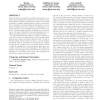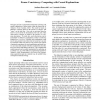110 search results - page 8 / 22 » Domain Descriptions Should Be Modular |
126
click to vote
DEON
2010
Springer
15 years 5 months ago
2010
Springer
We provide a logical analysis of private international law, the body of law establishing when courts of a country should decide a case (jurisdiction) and what legal system they sho...
132
click to vote
AAAI
1993
15 years 4 months ago
1993
learning (EBL) component. In this paper we provide a brief review of FOIL and FOCL, then discuss how operationalizing a domain theory can adversely affect the accuracy of a learned...
125
Voted
SIGSOFT
2003
ACM
16 years 3 months ago
2003
ACM
Model checking is emerging as a popular technology for reasoning about behavioral properties of a wide variety of software artifacts including: requirements models, architectural ...
119
Voted
NMR
2004
Springer
15 years 8 months ago
2004
Springer
This paper presents a computational model for reasoning with causal explanations of observations within the framework of Abductive Event Calculus (AEC). The model is based on abdu...
109
Voted
JAIR
2010
15 years 1 months ago
2010
As historically acknowledged in the Reasoning about Actions and Change community, intuitiveness of a logical domain description cannot be fully automated. Moreover, like any other...


